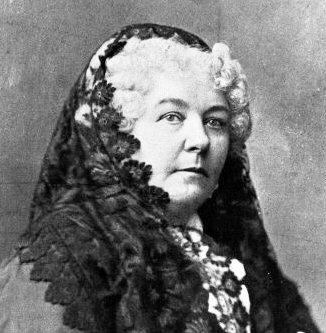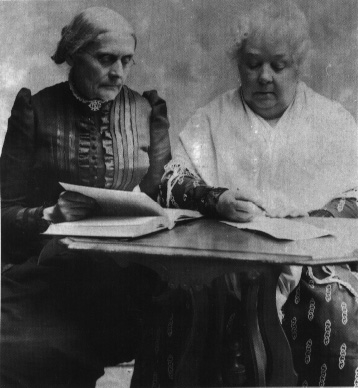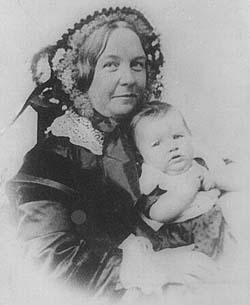 |
| Elizabeth Cady Stanton (http://mydropsofink.blogspot.com/2009_07_01_archive.html) |
Elizabeth Cady Stanton once said "'The happiest people I have known have been those who gave themselves no concern about their own souls, but did their uttermost to mitigate the miseries of others'" ("Elizabeth Cady Stanton Quotes"). Stanton devoted her life to advance the lives of others, at times without any support. She was a stern believer in equality among the sexes. She was born on November 12, 1815, in Johnstown, New York. Her father was a prominent lawyer that exposed her to discrimination acts against women at an early age. She attended Emma Willard's Troy Female Seminary in Troy, New York, and graduated in 1832. Stanton married in 1840 to an abolitionist, Henry Stanton. On their honeymoon, they attended an abolitionist convention in London. Because of her gender, Stanton was banned from attending the meeting. Outside the convention, She met Lucretia Mott, and together they planned to hold a women’s rights convention. There first convention successfully opened in 1848 when they held a National Women's Suffrage Convention in Seneca Falls, New York. Working with women like Susan B. Anthony and Mott, Stanton devoted the next fifty years of her life to women’s rights. Together they held conventions and began organizations like The American Women Suffrage Association and The National Women Suffrage Association. Stanton persuaded Senator Aaron A. Sargent of California to sponsor a woman’s suffrage amendment to the Constitution in 1878. Women, and other women’s rights reformers, reintroduced this amendment every year until it became a constitutional amendment in 1920. Unfortunately Stanton died on October 26, 1902, and never witnessed the fruit of her hard work. Stanton committed most of her life to fight for something she believed in. At the time when women’s rights seemed unattainable, Stanton helped change the country’s perspective. She is the reason men and women are equal today. A committed and just person, Stanton is a hero because she worked hard fighting for women’s rights and never gave up, even when she had little to no public support.
 |
| Elizabeth Cady Stanton and Susan B. Anthony (http://homepages.rootsweb.ancestry.com/~sam/cady/elizabeth.html) |
Stanton believed it was unconstitutional for men and women to be treated unequally. In a powerful speech at the Women’s Suffrage Convention, Stanton seized upon the opportunity to reveal the country’s flaws: “The male element is a destructive force, stern, selfish, aggrandizing, loving war, violence, conquest, acquisition, breeding in the material and moral world alike discord, disorder, disease, and death. See what a record of blood and cruelty the pages of history reveal!” (“The Destructive Male”). From this excerpt of Stanton’s speech, she clearly emphasized her opinion on the matter and the position she put herself in to change what was wrong. Stanton’s argumentative behavior made its way to the surface when she gave this speech. She not only felt women were treated unfairly, but also that all the wrongdoing in the country was in the hands of men. Using words such as selfish, loving war, violence, and death Stanton held men accountable for anything that impeded the success of the country. In a political petition to the senate, Stanton brought this to attention: "In making our demand for Suffrage, we would call your attention to the fact that we represent fifteen million people--one-half the entire population of the country--intelligent, virtuous, native-born American citizens; and yet stand outside the pale of political recognition" (Stanton, Elizabeth Cady, and Susan B. Anthony). Stanton made sure women had equal rights under all circumstances. The U.S. claimed to be a democracy, but how could it be when only the opinion of half the population was considered. Stanton brought this to the government's attention because it was unacceptable. Stanton values justice above all other things in the world. The United States only regarded the opinions of men, and therefor was not a true democracy until women were granted the vote. It is the responsibility of the United States to consider all opinions on a matter. The United States, like many other countries, was male dominant and thus only regarded their opinions. Stanton used her just values to overcome many other hardships with determination and commitment.
Stanton committed more than half her life in determination to make women’s rights a normality in the United States. Even without support Stanton wrote the Women's Bible. This bound men and women together under equal rights: "Later in her career Stanton, like Gage, focused increasingly on social reforms related to women's concerns other than suffrage. The two worked together on Stanton's Woman's Bible a work rejected by many of the more conservative elements in the movement" ("Elizabeth Cady Stanton"). Christianity was the most popular religion of the United States, and introducing an altercation to the Bible sounded absurd. However, Stanton willed herself to go to great lengths for women’s rights, even if it meant receiving hatred from the citizens of the United States. Stanton did more than almost any other person during this time of reformation to gain women the rights they deserved. She did all she could for women suffrage and knew it would be best if she introduced women’s rights in other ways during this time. Stanton committed herself to women suffrage and did not give up until the day she died: "In 1878, Stanton persuaded Senator Aaron A. Sargent of California to sponsor a woman suffrage amendment to the Constitution of the United States. This amendment was reintroduced every year until 1919, when Congress finally approved it. In 1920, it became the 19th Amendment to the Constitution" (Stanton, Elizabeth Cady, and Susan B. Anthony). Even in the later years of her life, Stanton fought with the same effort and commitment she did in the beginning. Although she was elderly, she still had enough passion towards women’s rights to persuade senators to agree and side with women on this amendment. She knew with hard work comes success and she stayed committed in women’s rights until the day she died. Stanton's efforts did not lessen as the years went on, but rather they became stronger as she worked harder. Although she knew she would not be able to participate in voting, her efforts did not diminish in the slightest way. Stanton dedicated her entire life to something she felt passionate towards, women’s rights, which grew into an entire reformation.
 |
| Elizabeth Cady Stanton and daughter, Harriot (http://www.nps.gov/nr/travel/pwwmh/ny10.htm) |
Stanton fought for the rights she believed in because she valued justice among men and women. She disregarded the hatred and criticism she received in order to carry through with her movement. Stanton's fight for women’s rights did not end when she knew she would not live long enough to take part in women suffrage. Justice and commitment radiated off her because she continued her efforts just as powerfully in the end as in the beginning because she believed women in the later years should be able to vote even if she couldn't. She gave up so much of her life for improving the lives of others. Stanton is an inspiration because even when times were at their toughest, she came through and continued her struggle with full effort. After she married she had seven children, and although this limited her contributions to the movement, she involved herself by writing motivational speeches that Anthony read at many conventions and rallies: "Stanton had seven children, and her duties as a mother limited her participation in the reform movements that had won her heart. Over the years, while her responsibilities kept her at home, she trained herself as a writer and used her pen to fight for justice" ("Elizabeth Cady Stanton 1815-1902"). The conventions and meetings she held inspired people all around the U.S., but the things she wrote were often just as moving and captured followers in a different perspective. Any leader in the world has learned if they want to touch the hearts of people around them, they have to go out of their way to make sure the people receive the best results-not always what is better for them. Stanton, as my hero, knew she would not be able to vote but justice kept her moving forward and today women can vote alongside men. She often put herself behind other’s who would also benefit from women suffrage. Making the lives of others better rather than her own satisfied her more than only regarding herself.
"Elizabeth Cady Stanton." National Park Service. U.S. Dept. of the Interior, 15 Sept. 2010. Web. 12 Dec. 2010.
"Elizabeth Cady Stanton 1815-1902." American Eras. Detroit: Gale, 1997. Gale Student Resources In Context. Web. 12 Dec. 2010.
"Elizabeth Cady Stanton Quotes." Women's History. New York Times Co., n.d. Web. 5 Jan. 2011.
"Elizabeth Cady Stanton the Descructive Male." The HIstory Place. N.p., n.d. Web. 2 Jan. 2011.
Stanton, Elizabeth Cady, and Susan B. Anthony. "Petition to the Senate and House of Representatives." Women in America. Woodbridge, CT: Primary Source Media, 1999. American Journey. Gale Student Resources In Context. Web. 13 Dec. 2010.
Page created on 1/28/2011 12:00:00 AM
Last edited 1/28/2011 12:00:00 AM
